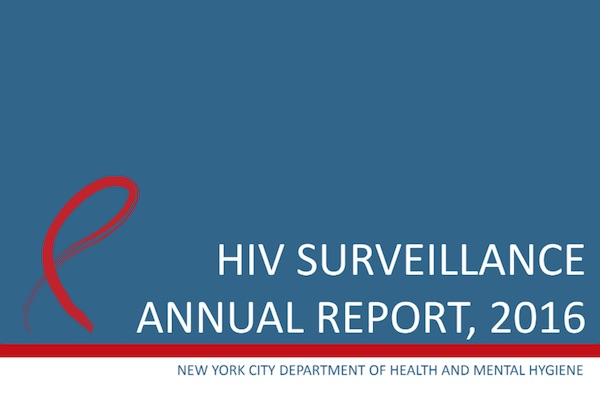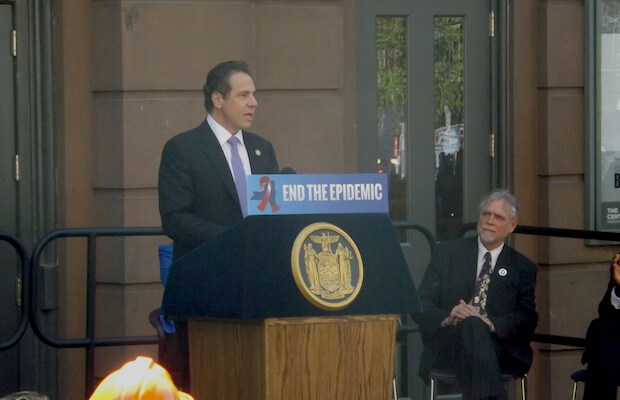Jonathan Santos-Ramos, the director of operations at Callen-Lorde’s new clinic in the South Bronx, with staff member Luis Prieto. | CALLEN-LORDE COMMUNITY HEALTH CENTER
Through a cooperative partnership as well as expansion and planned expansion beyond Manhattan, the city’s two non-profit LGBT-focused healthcare providers, Callen-Lorde Community Health Center and Apicha Community Health Center, are aiming to better meet the growing demand for culturally competent services for queer New Yorkers.
Two important steps in that effort have now been launched. On July 1, Callen-Lorde opened a new 3,500-square-foot clinic in the South Bronx on Third Avenue near 161st Street, its first footprint outside of Chelsea. Callen-Lorde and Apicha have also announced a partnership under which Callen-Lorde will offer clients it cannot serve in the time frame they require a “warm hand-off” to Apicha, which currently has unused capacity in its clinic at 400 Broadway in Chinatown.
These two developments are intended, explained Wendy Stark, Callen-Lorde’s executive director, to correct a current “capacity-demand mismatch” facing providers and consumers of LGBT-focused healthcare.
Callen-Lorde opens in Bronx; Apicha aims for Queens clinic in 2017
“Real estate is the real core problem,” Stark explained regarding Callen-Lorde’s inability to serve all comers in its two facilities in Chelsea.
By locating a new clinic in the Bronx, the organization can also better serve residents of that borough as well as Upper Manhattan, including hard-to-reach consumers such as youth and those without stable housing.
In that spirit, Apicha is nearing agreement on space in Jackson Heights, Queens, for a clinic that organization aims to open in mid-2017, and Callen-Lorde, over a one-to two-year horizon, hopes to establish a new facility in or near Downtown Brooklyn.
All of this activity comes as the demand for healthcare services grows with the full implementation of President Barack Obama’s Affordable Care Act and a year after both Callen-Lorde and Apicha were among 266 healthcare centers nationwide — only a handful of them focused on LGBT care — designated for the New Access Point program created under Obamacare. That program is designed to improve public health in underserved and vulnerable areas — such as the South Bronx — and guarantees each organization $650,000 in annual federal funding, as well as eligibility for federal malpractice insurance and cost-based reimbursement under the Medicaid program.
For health centers like Callen-Lorde and Apicha that offer care at low or no cost to certain patients, the unreimbursed cost of care is a significant concern that constrains the ability to expand services. With roughly 17,000 clients making 100,000 visits a year, Callen-Lorde’s Chelsea facilities had been incurring annual unreimbursed costs of care running at about $5 million, Stark said in an interview last year.
And there was little doubt that Callen-Lorde needed more space, if not in Chelsea then somewhere else in the city. At times, Stark said, the two Manhattan clinics have had to turn away 20 patients a day, even with a six-days, four-evenings a week schedule.
The new Bronx clinic, open just two weeks when Gay City News visited on July 15, will allow Callen-Lorde to serve up to 3,800 patients for about 20,000 visits per year. According to Jonathan Santos-Ramos, the clinic’s director of operations, most of the clients served to date traveled from neighborhoods in the Bronx or Upper Manhattan — many from the immediate vicinity of the facility — though some visited from as far away as Brooklyn and Queens, with one arriving from Massachusetts. Santos-Ramos, whose previous positions included nine years focused on HIV work at Callen-Lorde as well as similar responsibilities with the city health department, returned to Callen-Lorde four months ago from a Community Healthcare Network clinic in Washington Heights, where, he said, about three-quarters of the patients were Spanish speakers. The new Callen-Lorde clinic is fully bilingual.
The Bronx facility is part of a five-story development in which the other major provider will be BOOM!Health, which is establishing a wellness center to provide HIV prevention and health-related, employment readiness, and other community services to underserved populations including youth and women. BOOM!Health first reached out to Callen-Lorde several years ago so that the Chelsea-based organization could provide the direct medical services for the overall project.
The new Callen-Lorde clinic in the Bronx is fully bilingual. | CALLEN-LORDE COMMUNITY HEALTH CENTER
One priority for the new Bronx facility is to serve members of the community who are homeless, have unstable housing situations, or have erratic work opportunities — all factors that can make it difficult to keep medical appointments. Using a “one-half open access” approach, the clinic will reserve half of the appointment times for people who call the day of or the day before. Between eight and 10 percent of the patients served by Callen-Lorde’s Chelsea clinics are homeless. However, 80 percent of its Health Outreach to Teens (HOTT) program’s patients are homeless or have unstable housing situations. Transgender clients, for whom culturally competent care is particularly important, are also at high risk for homelessness or housing instability.
For Apicha, the new partnership comes at a welcome moment in terms of both its capacity and the evolution of its mission. Beginning in 2009, the organization expanded beyond its original focus on the delivery of HIV services, especially to the Asian and Pacific Islander population, to include general primary care. Its expertise was in the LGBT community, where more than 70 percent of its current patients come from, but its reach within communities of color beyond the Asian community has grown, with nearly a fifth of its clients African-American and a comparable number Latinx, as compared to just under a third API. Almost 20 percent of its patients identity as transgender or gender-nonconforming. With a growing presence and expertise in non-Asian communities of color as well as among APIs, Apicha can reach a wider spectrum of patients with a new clinic in Jackson Heights, which, by the end of 2018, could serve as many as 4,000 patients a year.
In contrast, APICHA’s home on Lower Broadway is currently operating below capacity, serving roughly 2,000 patients out of a total of 4,000 that could be handled. Therese Rodriguez, Apicha’s chief executive officer, sees the cooperative arrangement with Callen-Lorde as a way of ensuring that healthcare resources are available where and when they are needed.
“We are both in the position of the being assets in the community,” Rodriguez said of her organization and Callen-Lorde. “We both have histories of culturally competent care that go back over many years. This important partnership will ensure that the needs of our community are met.” Needs, she added, that have grown since Obamacare broadened access to healthcare among underserved segments of the population.
Rodriguez said her organization’s capacity for serving the transgender community has been among its most significant distinguishing strengths in recent years. Though the Broadway clinic now offers care to those 18 and older, in Jackson Heights Apicha plans to test the level of demand for pediatric services, as well — a timely expansion given the emerging medical and psychosocial discussion about the appropriate standards of care for gender-nonconforming youth.
Given the frequency with which non-profit organizations compete with each other for primacy in delivering services, the cooperation between Apicha and Callen-Lorde is a heartening example of community organizations subordinating institutional prerogatives to the needs of the constituents they exist to serve. And there is plenty of generosity in the way leaders of these two organizations talked about their shared mission.
“Through the years Apicha Community Health Center has followed in Callen-Lorde’s footsteps as we expanded our services,” Rodriguez said. “We deeply appreciate their constant and generous support. We are proud that we are now raising our relationship to a partnership — together providing the culturally competent healthcare and support services our community needs. For both of us, it has always been about community.”




































